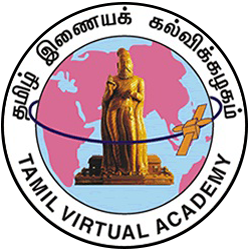Primary tabs
-
C01246 அந்தாதி LITERATURE
Andaadhi literature is a type of Tamil literature. Although Andaadhi emerged as an independent form of literature only in later times, traces of it can be found in Sangam literature itself. More than 1500 works of Andaadhi literature have been documented. Among the various types of Sittrilakkiyangal, the maximum number of works are in the form of Andaadhi literature.
The word Andaadhi is made up of Andam (meaning end) and Aadi (meaning beginning). That which begins with the end is therefore called Andaadhi. The last syllable, foot or word of a verse forms the first syllable, foot or word of the next verse. This formation is called Andaadhi. The andaadhi found in a couplet is called Andaadhi Thodai and that found between two verses is referred to as Andaadhi Cheyyul. As it was easier to learn by heart and remember verses composed in this form, most of the poets preferred to write Andaadhis.
The Andaadhi structure can be found even in Sangam literature. An example of this is பதிற்றுப்பத்து, நான்காம்பத்து. Religious poets who were responsible for the composition of several works of Sittrilakkiyam, can be said to have originated Andaadhi literature also. The earliest work of Andaadhi literature available to us, is அற்புதத் திருவந்தாதி composed by Karaikkaal Ammaiyar.
Most of the works belonging to Andaadhi literature are religious in nature. They deal with holy shrines, their deities, saints, poets, philanthropists, important incidents in their lives and so on. There are, however, a few exceptions such as திருவிடைமருதூர் அந்தாதி.
The most notable of Andaadhis, is Abhirami Andaadhi, composed by Abhirami Battar. It is sung in praise of the Goddess Abhirami, the presiding deity of Thirukkadavoor. This town, situated in Nagappattinam district, is renowned for three things -- the deity, the shrine and its holy water. The deity of Goddess Abhirami is endowed with exceptional power and grace. Abhirama Battar was born in Thirukkadavoor, in a very orthodox and religious Brahmin family. He was well-versed in Tamil, Sanskrit and astrology. His devotion to Abhirami was so great that he would often forget himself while meditating and fall into a trance. At such times he appeared to be a lunatic to others.
Thanjavur, then, was ruled by King Serfoji the II. Once, during his trip to Thirukkadavoor, the king worshipped Goddess Abhirami and on his way out of the temple, saw Battar. He enquired as to who Battar was. Those nearby, told him that he was an eccentric. Nevertheless, the King asked Battar, "Is it the New Moon tonight?" Battar, who saw in his mind's eye, the Goddess Abhirami in the form of a resplendent Moon, said "It is the Full Moon tonight". The King, assuming that what the people told him about Battar was true, left the temple. That night, however, the King had a dream in which the Goddess appeared as the Full Moon, confirming what Battar had said. The King later visited the poet in his house and presented him with fertile lands. As a token of his gratitude to the Goddess, Battar completed the Abhirami Andaadhi commened earlier. This incident proves the fact that unflinching devotion to Goddess Abhirami will bring manifold blessings to the devotee.
This lesson gives the complete picture of அந்தாதி Literature in general and அபிராமி அந்தாதி in particular.


